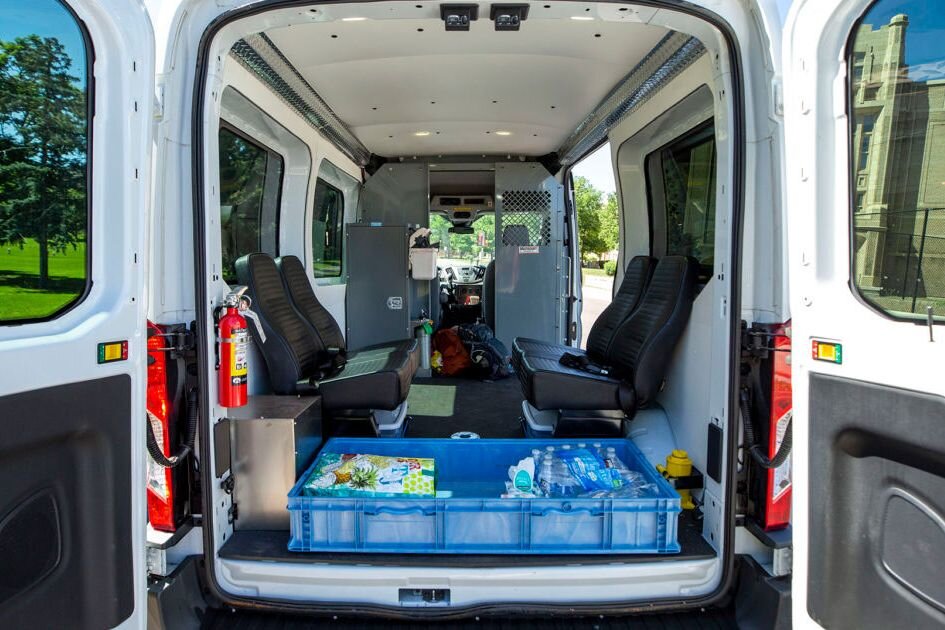
Non-Police Response Teams make communities safer.
It is expensive, ineffective, and dangerous to our community to send in police to do a social or health-care worker’s job.
The Problem:
With over 7 million 911 calls made in Colorado each year, police have become the first response a wide range of social issues, from mental illness to substance use to homelessness.
Using police to respond to people in crisis is is expensive, ineffective, and deadly, as seen in the disproportionate number of Coloradans with mental illnesses and substance use disorders held in our state’s jails and prisons, and the number of people killed by Colorado police every year.
54%
Colorado is 6th in the nation for police killings and over half of police killings since 2017 have been response to low-level or NO level offenses, like traffic violations or mental health calls.
75%
Up to 75% of people in Colorado's jails at any given time suffer from a mental illness.
18%
Unhoused people make up less than 1% of Colorado’s population, but account for 18% of Coloradans in jail.
Although many officers may possess de-escalation skills, the mere presence of armed, uniformed officers with police vehicles can exacerbate feelings of distress and escalate mental health-related situations, particularly in Black communities and other communities of color where relationships with police are historically characterized by tension and distrust. 1 Colorado has a long history of racialized policing and has 5th highest rate of police killings in the country.
Too often, encounters between the police and Coloradans in crisis end in further destabilization of people’s lives through unnecessary arrest or even death, rather than offering the assessment and long-term support they need to survive and thrive.
How to take action in Colorado
Help implement an Alternate Responder Program in your city.
The Solution:
Non-police response teams have thrived and expanded in multiple cities, saving lives and tax-dollars.
A significant portion of 911 calls are related to quality-of-life and other low-priority incidents that may require a time-sensitive response but are better suited to civilian responders, rather than armed police officers.
Alternate responder teams are unarmed teams equipped with specialized responders such as social workers and health care workers, that get better outcomes at less expense to the taxpayer for mental health emergencies, people experiencing homelessness, and intoxication and substance-use issues. Many programs are looking to expand the scope beyond these issues as well, to further reduce the potential for harm.
Non-response team case studies
Denver STAR Program
The Support Team Assistance Response (STAR) team is a community program that redirects some 911 calls to a Mental Health Center of Denver social worker and a Denver Health paramedic. STAR re-imagines public safety using harm reduction methods and removing the police from non-violent situations. Denver is already expanding its STAR program from one to four vans and extending STAR's hours of operations from eight to sixteen hours and from five to seven days a week. In the first 6 months:
68%
of the calls involved people experiencing homelessness
52.6%
of the calls involved people with mental health issues.
41%
of people were to referred shelters, crisis centers or hospitals
0
calls led to arrest or required Denver Police assistance.
Photo: whitebirdclinic.org
Eugene CAHOOTS Program
CAHOOTS (Crisis Assistance Helping Out On The Streets) is a mobile crisis-intervention program that was created in 1989 in Eugene, Oregon. It has since saved taxpayers $8.7 million dollars a year, while creating better outcomes for residents.
2%
of the safety budget used
17%
share of the city’s 911 calls
1%
of the calls needed police backup
$8.7 million
taxdollars saved per year
Sources and further reading:
https://www.vera.org/behavioral-health-crisis-alternatives
https://www.interruptingcriminalization.com/non-police-crisis-response-guide
https://aclu-co.org/wp-content/uploads/2021/05/SB21-273-Fact-Sheet.pdf
https://aclu-co.org/wp-content/uploads/2021/03/SB21-62-Fact-Sheet.pdf
“It’s critical that we send the right response. That’s how we get the better outcomes...You have a safer community and you have better outcomes for people in crisis.”
We’re supporting DASHR and Next Phase Policy in their efforts to get pilot Alternate Responder Programs implemented throughout Colorado.
Help start an Alternate Responder Program in your city in Colorado.
In Lakewood, Colorado? Take action here





